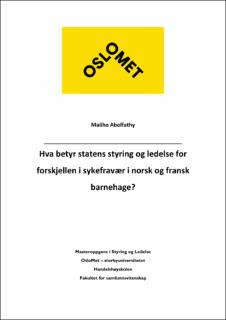| dc.description.abstract | Norway has one of the world's highest sickness absence, at the same time as it is one of the world's best countries to live in. A Norwegian and a French kindergarten in Nesodden / Oslo have10 and 2% sickness absence, respectively. The reasons are probably complex. This thesis will explore how the state's governance and leadership, affects norms, which in turn affects sickness absence.
Theory
The thesis explores whether the causal relationship can be partly explained by the fact that the state's power and thus its governance is different in Norway and France. This is done by studying tripartite cooperation in Norway towards a more centralized governance in France.
Method
To investigate whether the Norwegian and French employees in the various institutions had different norms in relation to sick leave, and where they assumed their own norms had their origin, I conducted "focused interviews" of employees in kindergartens at Nesodden and at The French school in Oslo . The analysis of data was done with Prof. Aksel Tjora's SDI method for generating theory and concept development. Michel Foucault's philosophy of science is used to show how power affects governance, which affects norms and thus sickness absence.
Results
There was a big difference between the perception of what is "illness" and what justifies sick leave. The Norwegian norms were more concerned with rights to sick leave, while the French norms were more concerned with obligations towards the employer.
Discussion
There is reason to assume that tripartite co-operation in Norway gives the state limited power over the possibility of stricter legislation, but participates in negotiations on inclusive working life, where e.g. 24 days to "self-declaration" per year are included. This has led to norms where > 50% of sick leave is not due to illness. In France, the concept of illness is much stricter and must be authorized by a doctor.
Conclusion
The state's limited power over the sick pay scheme in Norway means that sick leave is higher than in other countries. High sickness absence gives dysfunctional features that do not benefit the employees in that it impedes professional development and provides extra work and irritation for those who come to work. | en_US |
